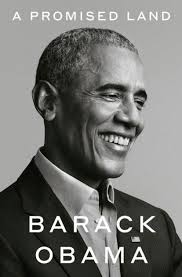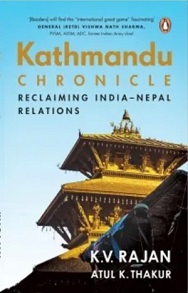The advantage with presidential memoirs of articulate politicians like Barack Obama is that apart from profound thoughts, travails, dilemmas and policy decisions a US President makes, they bring into life with vivid description the humane sentiments accompanying their work in office. The Book “A Promised Land’’ lives up to the reputation of Barack Obama as a prolific writer and makes it an engaging read. Being a bestselling author even before Presidency, Barack Obama in the book A Promised Land reminisces his work from being an idealist community organizer before eventually taking the plunge to politics. Starting with some insights delving into early childhood, the memoir covers the community organizer days, State Senate experience and Presidential campaign to eventually becoming the first African American President in US history. The story telling laced with factual information, ruminations on course of alternatives actions, anecdotes and idealistic dilemmas of a President makes it an interesting read.
The book is heavy on idealism in initial chapters and brilliantly captures the pondering of the African American man in his 20s on a range of subjects especially race relations. The historical backgrounds, personal experiences and a striving for a sense of identity are dwelled upon in the pages as Barack Obama reconciles the ideal America of his dreams to its uncomfortable past - In his words, “what the country was, and what it could become’’. The engaging anecdotes grips the reader as he sums up his youth stating ‘’Dream on, Barack’’ is how arguments with my college friends would end as they dropped a newspaper in front of me, its headlines trumpeting the US invasion of Grenada or cuts in school lunch program or other disheartening news. ‘’Sorry but that’s your America’’ they would say.1
The theme of idealism and the gap between ideals and reality is narrated brilliantly throughout the book notably in his efforts at bipartisan support for his bills. Into his Presidency, the writer evokes a sense of victimhood of the inherited wars (Iraq and Afghanistan) and inherited recession. At one point the writer does admit that ‘’I reminded myself that every president felt saddled with previous administrations choices and mistakes, that 90 per cent of job was navigating inherited problems and unanticipated crises’’.2 A sense of bitterness towards Republicans, Fox News and Koch Brothers is a recurring theme throughout the book as is the frustration of getting past filibuster attempts in Senate.
Apart from Barack Obama’s predictable attempt at defending his legacy and shedding light on thoughts behind his decisions, the Book is rich in emotions detailing his transition, frustrations and fears as the occupier of White house while also giving sneak peek into his life in office.
As President-elect about to take office he recollects “my mind was drifting back to previous evening when I received a briefing from director of the White house military office on the ‘football’ – the small leather jacketed suitcase that accompanies the president at all times and contains codes needed to launch a nuclear strike. One of the military aides responsible for carrying football explained to me the protocols as calmly and methodically as someone might describe how to program a DVR. The subtext was obvious - I would soon be vested with the authority to blow up the world’’3
The Obama administrations Troubled Asset Relief Program (TARP) which has been the cause of much heartburn in the aftermath of subprime crisis is recounted illuminating the readers to the thoughts behind the stimulus package. Barack Obama clearly puts himself in the camp of Keynesian economists by refusing to cut federal spending even as Republicans turn political heat in Senate and popularity ratings plummet. The White house considering the moral hazard of letting Wall Street get away with a bailout to prevent a systemic crisis brings forth the legal and ethical challenges amidst a financial crisis when investment bankers continued to dole out generous bonus to themselves. Obama zeroes in on stress test of financial institutions as the best shot under the circumstances summed up the decision ‘’I was constantly dealing with probabilities, a 70 per cent chance, say, that a decision to do nothing would end in disaster; a 55 per cent chance that this approach versus that one might solve the problem (with a 0 per cent chance that it would work out exactly as intended)’’.4 Obama goes to great lengths to explain the rationale of the decisions including intervention to prevent default of Greece and other EU nations while France and Germany continued to seek stringent conditions for bailout.
A number of amusing conversations and interesting banter splintered throughout the book makes it an easy read. A curious conversation from the book where Obama asks King Abdullah of Saudi:
‘’I hope you don’t mind me asking, Your Majesty.’’ I said, ‘’but how do you keep up with twelve wives?
‘’Very badly’’ he said shaking his head wearily. “One of them is always jealous of the others. It’s more complicated than Middle East politics’’5
Personal conversations enliven the book. When underwater video of spill of Deepwater Horizon rig (BP Oil spill) was telecast real time by news channels a 9 year old tells Obama “if I didn’t get the leak filled soon, I was going to have a lot of political problems’’. Sasha (Obama’s daughter) asks “Did you plug the hole yet, Daddy?” 6
The extreme cynicism which he fought against on a platform of hope won’t last as he realized just a couple years into Office while dousing one fire after the other right from his healthcare bill stuck in Senate to numerous terror threats. He points out that the top secret Presidential Daily Briefings or PDB was called by Michelle Obama as “The Death, Destruction and Horrible Things Book’’. 7
The resulting pessimism is amply demonstrated when he writes once getting a call early in morning.
“Calls that early from my staff were rare and my heart froze. Was it a terrorist attack? A natural disaster?
‘’You were awarded the Nobel Peace Prize,’’ Gibbs said.8
While Obama would ruminate towards the end of first Presidential campaign whether expectations he aroused could ever match reality, the Noble Peace Prize to him would trigger his self-questioning mind with the same thoughts. The irony of getting Nobel Peace Prize while expanding the scope of Afghan war and committing more troops wasn’t lost on him.
With Iraq and Afghanistan in a state of turmoil well before his first term, Obama dedicates entire chapters rationalizing his Middle east policy right from American intervention in Benghazi (Libya) to attempts at brokering a peace in White house dinner with Israeli Benjamin Netanyahu, Egyptian Hosni Mubarak, King Abdullah of Jordan and Palestinian Mahmoud Abbas.
On one hand he displays understanding of Arab world contrary to his predecessor and writes ‘’Contrary to the beliefs of many in the Arab world, the United States is not a grand puppet master whimsically pulling the strings of the countries with which it does business. Even governments that rely on our military and economic assistance think first and foremost of their own survival and the Mubarak regime was no exception.’’9 On the other hand, he notes the resistance of entrenched members of US security establishment shying away or hesitating to act against despots and authoritarian regimes with dismal human rights record or civilian resistance.
Obama is candid about stating his judgments of world leaders. Angela Merkel is described as “steady, honest, intellectually rigorous and instinctually kind’’10. Sarkozy on the other hand was all “emotional outbursts and overblown rhetoric’’11. UK Prime Minister David Cameron is described as someone with “youthful appearance and studied informality’’.12 Obama also bitterly recounts the faceoff with current President Donald Trump who had questioned validity of his birth certificate leading to various conspiracy theories regarding his American citizenship.
From an Indian perspective, the observations of Obama about the Congress government doesn’t behove well for a country which is the biggest democracy in the world. While Obama writes about Prime Minister Manmohan Singh positively, the astute politician in him doesn’t fail to note that “He hadn’t originally become prime minister as a result of his own popularity. In fact he owed his position to Sonia Gandhi who declined to take the job herself and had instead anointed Singh.’’13 While the observation of former US President is common knowledge in India, it points to a deeper problem in Indian politics which Obama probably realized but didn’t put into words namely dynastic tendencies.
The book concludes with final chapter focusing on killing of the ‘Pacer’- a man who just walked around but never left an Abbottabad compound which CIA identified could be Osama Bin Laden. While CIA expressed a 60 – 80 per cent certainty that it was Bin Laden, the National Counterterrorism Centre reported only 40 to 60 per cent certainty.14 The book ends as US Navy Seals successfully identify and kill Osama Bin Laden in a nail biting turn of mission at dark of night. What comes as a setback to Pakistan in the mission is that Obama’s book doesn’t even mention long deliberations on whether Pakistan should be informed. Instead the National Security Establishment and US President himself seem convinced that it would result in tip off even though they knew the mission impinges on sovereignty of Pakistan. The Indian position that Pakistan is a safe haven, perpetrator and co-conspirator of terror seems to be an accepted fact even during Obama administration.
What makes the book readable is a brief historical background which Obama brings in to each issue at hand before indulging the reader in the narrative, flow of events, anecdotes and impressions which he carried and how it affected his decisions given the constraints of real politick.
A Promised Land by Barack Obama lives up to the Promise of being an essential read to understand the thoughts and constraints which governed Obama years in White House. It’s however clear that the Promised Land of an ideal America envisioned before his Presidency continues to remain a work in progress with China knocking on the doors of super powerdom as foreseen by Obama. In his words “Looking back, I sometimes ponder the age-old question of how much difference the particular characteristics of individual leaders make in the sweep of history- whether those of us who rise to power are mere conduits for deep, relentless current of the times or whether we’re at least partly the authors of what’s to come. I wonder whether our insecurities and our hopes, or childhood traumas or memories of unexpected kindness carry as much force as any technological shift or socioeconomic trend.”15
Endnotes
- A Promised Land by Barack Obama, Chapter 1, Page No. 25
- A Promised Land by Barack Obama, Chapter 14, Page No. 350
- A Promised Land by Barack Obama, Chapter 10, Page No. 235
- A Promised Land by Barack Obama, Chapter 12, Page No. 300
- A Promised Land by Barack Obama, Chapter 15, Page No. 367
- A Promised Land by Barack Obama, Chapter 23, Page No. 569
- A Promised Land by Barack Obama, Chapter 13, Page No. 318
- A Promised Land by Barack Obama, Chapter 18, Page No. 442
- A Promised Land by Barack Obama, Chapter 25, Page No. 645
- A Promised Land by Barack Obama, Chapter 22, Page No. 527
- A Promised Land by Barack Obama, Chapter 14, Page No. 340
- A Promised Land by Barack Obama, Chapter 22, Page No.527
- A Promised Land by Barack Obama, Chapter 24, Page No. 600
- A Promised Land by Barack Obama, Chapter 27, Page No. 682
- A Promised Land by Barack Obama, Chapter 25, Page No. 631











Post new comment